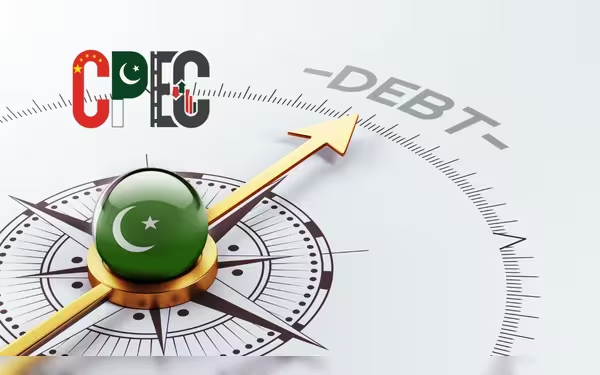Thursday, November 7, 2024 09:46 PM
CPEC Energy Debt Reprofiling: A Billion-Dollar Economic Dilemma
- Debt reprofiling increases Pakistan's financial burden by $1.22 billion.
- Extended loan repayment raises concerns over economic sustainability.
- CPEC projects promise growth but lead to rising national debt.
 Image Credits: thecurrentpk
Image Credits: thecurrentpkPakistan considers CPEC debt reprofiling, increasing financial burden by $1.22 billion, raising concerns over long-term economic sustainability.
In recent developments, Pakistan is grappling with the implications of a significant financial maneuver involving the China–Pakistan Economic Corridor (CPEC). The government is considering a debt reprofiling strategy for energy projects linked to CPEC, which entails extending a $15.4 billion loan. This move is seen as a potential lifeline for the country, but it comes with its own set of challenges and consequences.
The proposed debt reprofiling is expected to increase the overall debt burden by approximately eight percent, translating to an additional $1.22 billion. This increase is not merely a number; it represents a substantial financial commitment that Pakistanis will have to shoulder in the coming years. The extension of the loan repayment period by five years may seem like a relief at first glance, but it is crucial to understand that the interest on the principal amount will continue to accumulate during this time.
For many citizens, the prospect of extended debt repayment is a double-edged sword. On one hand, it provides a temporary respite from immediate financial pressures, allowing the government to allocate resources to other pressing needs. On the other hand, it raises concerns about the long-term sustainability of Pakistan's economy. The increasing debt load could hinder future economic growth and development, leaving the country in a precarious position.
Moreover, the implications of this financial strategy extend beyond mere numbers. It reflects the broader challenges faced by Pakistan in managing its economic landscape, particularly in relation to foreign investments and international partnerships. The CPEC has been touted as a game-changer for the country, promising infrastructure development and energy security. However, the rising debt associated with these projects raises questions about the viability of such initiatives in the long run.
As Pakistan navigates this complex financial terrain, it is essential for policymakers to strike a balance between immediate relief and long-term economic health. The decision to extend the loan repayment period should be accompanied by a robust plan to enhance revenue generation and reduce dependency on external borrowing. Only then can Pakistan hope to achieve sustainable economic growth and improve the living standards of its citizens.
While the debt reprofiling for CPEC energy projects may offer temporary relief, it is imperative for the government to consider the long-term ramifications of increasing the national debt. The path forward must be paved with careful planning and strategic decision-making to ensure that the benefits of such financial arrangements do not come at the cost of future generations. Pakistanis deserve a stable and prosperous economic future, and it is the responsibility of their leaders to deliver on that promise.













